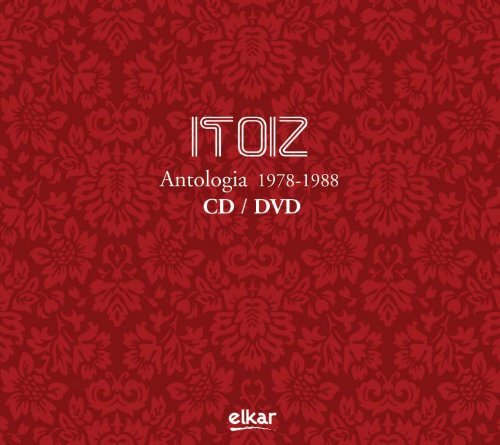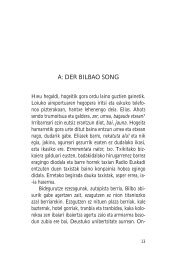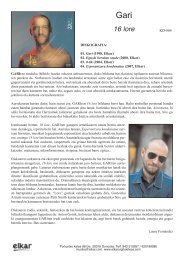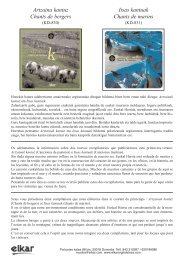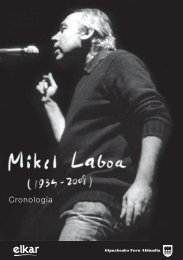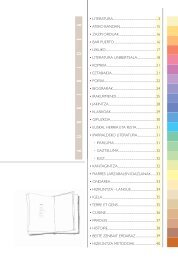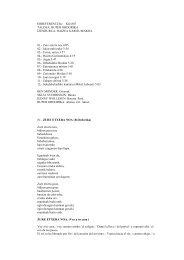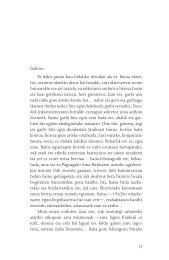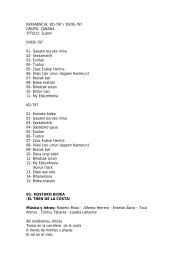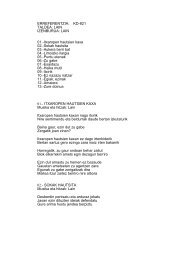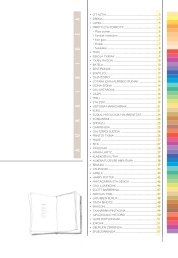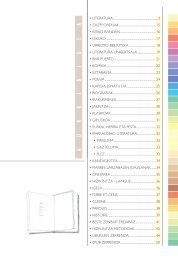Untitled - Elkar Argitaletxea
Untitled - Elkar Argitaletxea
Untitled - Elkar Argitaletxea
Create successful ePaper yourself
Turn your PDF publications into a flip-book with our unique Google optimized e-Paper software.
Antologia
(Indar Trabes 1974-78)<br />
Hamar urte iraun zuen Itoizen historia ofizialak,<br />
lehen diskoaren argitalpenetik<br />
Bordelen emandako azken kontzertura<br />
artekoa. Zazpi diskok, ehunka kontzertuk<br />
eta euskal rock zaletuen oroimenean ezabaezinak<br />
diren hainbat kantuk osatzen dute<br />
taldeak utzitako ondarea. Haatik, Itoizen<br />
ibilbidearen ikuspegi osoa izateko ez da<br />
nahikoa lehen grabaziotik abiatzea, ezinbestekoa<br />
da atzerago joatea, 1974. urtera,<br />
orduan sortu baitzen Indar Trabes, geroago<br />
Itoiz izango zenaren hazia. Ondarroa eta<br />
Mutrikuko bost gaztek, hamabost-hamasei<br />
urtekoak, institutuan sortu zuten Indar<br />
Trabes. Juan Carlos Perez (ahotsa eta<br />
gitarra) eta Jose Garate Foisis-ek (baxua) jada bazekiten zer zen jendaurrean jotzea, 1973an<br />
Akelarre bikotea sortu baitzuten. Biak izan ziren Itoizen hondarrera arte iraun zuten bakarrak.<br />
Haiekin batera, Estanis Osinalde (bateria), Antton Fernandez (teklatuak) eta Joseba Mendizabal<br />
(gitarra) izan ziren Indar Trabeseko lehen partaideak. Ondarroako Venecia dantzalekuan eman<br />
zuten lehen kontzertua, 1974ko abenduaren 21ean, ikasle festa baten barruan. Taldekoen laguna<br />
zen Angel Azkarraga "Matxitxa",<br />
beste partaide bat bezala hasten<br />
da manager lanetan eta<br />
honela jarraitzen du Itoiz-en<br />
bukaera arte.<br />
Rock talde bat izateko bokazioarekin<br />
sortu zen Indar<br />
Trabes, baina garai hartan apenas<br />
zegoen rock mugimendurik<br />
Euskal Herrian, eta dantzaldiak<br />
ematea zen taldeek diru pixka<br />
bat irabazteko zuten irteera<br />
bakarra. Indar Trabes ere horretan<br />
hasi zen 1976an, baina<br />
buruan garbi zuten hura zubia<br />
izango zela egunen batean rock jaialdietan aritzeko. Horrela, garaiko euskal abesti ezagunez<br />
gain, eurek sortutakoak jotzen zituzten dantzaldietan. Taldea oso ezaguna egin zen Bizkaian,<br />
batez ere Gernika aldean. Euskaraz abesten zuen talde bakanetakoa izateaz gain, kantu propioek<br />
oso harrera ona zuten entzuleengan. Tarteka, rock jaialdietan parte hartzeko aukera izaten<br />
zuten eta horrelakoetan, film bat pantailaratzen zuten “Goizeko deiadar” kantuan, itsasoaren<br />
irudiekin. Garai hartakoak dira Itoizen lehen diskoa osatuko zuten kantu guztiak, bat izan ezik:<br />
“Astelehen urdin batean”.<br />
Hasieratik Juan Carlos Perez ageri zen taldeko konpositore nagusi gisa. Nazioartean gogor<br />
jotzen zuen rock sinfonikoa (Genesis, King Crimson, Jethro Tull...), euskal tradizioaren erromantizismoa<br />
eta kostaldeko herri bateko bizitzaren giro bukolikoa nahasten ziren lehen konposizio<br />
haietan. Hitzak berriz, ilunak, barnekoiak eta surrealistak, Lekeitioko bi poeta<br />
gazterenak ziren: Joseba Alkalde eta Joseba Garcia.<br />
(Itoiz 1978)<br />
1978. urtean disko bat grabatzeko aukera iritsi zitzaien. Jaime<br />
Yarrituk Xoxoa disketxea sortu berria zuen, eta Indar Trabes taldearengan<br />
jarri zuen berau estreinatzeko konfiantza. Ordurako<br />
Joseba Mendizabal ez zegoen taldean; Joseba Erkiaga flauta<br />
jolea aldiz, taldekide berria zen. Erkiagaren flauta funtsezkoa<br />
izan zen taldearen lehen bi diskoetako soinuan. Kantuak Indar<br />
Trabesenak izan arren, diskoa Itoizen izenarekin kaleratu zen,<br />
hain zuzen ere Indar Trabesen izenak dantzaldiekin lotzen zuelako<br />
taldea. Zubiaren beste aldean zeudela azpimarratu nahi zuten.<br />
Grabatu eta zazpi hilabetera argitaratu zen diskoa, 1978ko<br />
Durangoko Azokan. Garai hartan sariak banatzen zituen Azokak,<br />
eta Itoizen lehen lanak urteko disko onenarena jaso zuen.<br />
Kritikak ere onak izan ziren. Ozono aldizkariak, esaterako,<br />
hileko diskoa izendatu zuen 1979ko urtarrilean: “Musikalki,<br />
talde sinfoniko anglosaxoi askok baino maila hobea dute.<br />
Camelen lehenengo lanak bezala (...) Kantu akustiko zoragarri bat<br />
dago, Lau teilatu, folklore britainiarraren aire batzuk gogora<br />
ekartzen dizkidana (...) Oso ondo grabatutako diskoa,<br />
oso-oso interesgarria. Oso ona”. Errobi<br />
desegin ondoren, artean hastapenetan zegoen<br />
euskal rockaren ikur bihurtu zen Itoiz.
“Muskaria” euskal musikari buruzko lehen aldizkariak hari eskaini zion bere lehen zenbakiko<br />
elkarrizketa nagusia.<br />
Diskoaren grabaziotik argitalpenera arte plazetan jotzen jarraitu zuen taldeak Indar Trabes<br />
bezala. Epe horretan hainbat faktore elkartu ziren, taldearen desagerpena eragin zutenak: dantzaldiek<br />
sortutako nekea eta desilusioa batetik, eta bi taldekide soldaduskara joateko obligazioa,<br />
bestetik. Itoizen lehen diskoa kaleratu zenerako, taldea iragana zen. “Itoiz” bezala behin bakarrik<br />
jo zuen 1978ko Durangoko azokan honako formazioarekin: Pedro Jose Laka (bateria), Foisis<br />
(baxua), J.C. Perez (ahotsa), Antton Fernandez (teklatuak) eta Joseba Erkiaga (flauta).<br />
(Ezekiel 1980)<br />
Geldialdi baten ondoren, Juan Carlos Perezek musika egiteari ekin zion berriz. Ikasketak zirela<br />
medio, Deustun bizi zen ikasle pisu batean eta han konposatu zuen Ezekiel diskorako musika;<br />
honetan oinarriturik, Alkaldek harentzako poema idatzi zuen. Proiektu berezi hura argitaratzeko<br />
Xoxoara jo zuen, Itoizen izenarekin kaleratzeko<br />
asmorik gabe, baina disketxeak<br />
berak proposatu zion jadanik ezaguna zen<br />
izena erabiltzea. Ezekiel diskoan, munduari<br />
buruz garai hartan zuen kontzepzio<br />
filosofikoa islatu nahi izan zuen Perezek.<br />
“Belaunaldi aldaketaren arazoarekin topo<br />
egiten duen Ezekiel gaztearen istorioa da,<br />
zapaltzen duen munduaren aurka borrokatzen<br />
saiatzen da, indarkeriaz baliatzen<br />
da eta erabateko dekadentzia aurkitzen<br />
du. Hortaz, musika ere dekadentea da”,<br />
zioen abeslariak garai hartan.<br />
Itoizek sinatu arren, ez zen taldean landutako<br />
diskoa izan. Lehen diskoa grabatu<br />
zutenetatik Joseba Erkiagak eta Antton<br />
Fernandezek soilik hartu zuten parte Ezekiel-en, eta Perezek noski. Gainerakoak kolaboratzaileak<br />
izan ziren: Fran Lasuen (Izukaitz, Oskorri), Carlos eta Shanti Gimenez (Klabelin Komik), Mitxel<br />
Longaron, Itziar Egileor, Joseba Beristain eta Ondarroako Etorkizuna Ume abesbatza. Denen<br />
artean oso disko anbiziosoa, “jazzeroa eta antikomertziala” grabatu zuten, Perezen hitzetan.<br />
“Biribildu gabeko ideia on bat izan zen, geldialdi bat Itoizen bidean, baina hutsune hori bete<br />
beharra zegoen”.<br />
Talde gisa lan egin ez arren, diskoa zuzenean aurkezteari<br />
ekin zioten. Foisis soldaduskatik itzulia zen eta berriz sartu zen<br />
taldean. 1980ko udan berriz kontzertuak emateari ekin zion<br />
Itoizek. Bi formazio izan zituen taldeak Ezekiel-en zuzeneko<br />
aurkezpenetan. Lehenengoan, Juan Carlos Perez (ahotsa eta<br />
gitarra), Foisis (baxua), Antton Fernandez (teklatuak), Javi<br />
Robador (bateria), Carlos Gimenez (saxoa), Gonzalo Muga<br />
(flauta) eta Fran Lasuen (biolina) izan ziren. Taldea jada ez da<br />
Ondarroa eta Mutrikura mugatzen, eta Bilboko lagun eremura<br />
zabaltzen da.<br />
Taldeak zuzenean uzten duen sentsazioa ez da oso ona.<br />
1980ko udan 9.000 pertsonaren aurrean jo zuen Itoizek<br />
Lekeitioko Karraspio hondartzan, Puskarra, Negativo, Zimel eta<br />
Zygnus taldeekin batera. Hona hemen Muskaria aldizkarian<br />
kaleratutako artikuluak zioena: “Eskaini ziguten ikuskizunean<br />
lehen diskoko zenbait kantu eta Ezekiel-eko zati batzuk tartekatu<br />
zituzten. Eszenaratzea oso eskasa da, ordezkatu nahi<br />
duten musika babes dezakeen inolako trebetasun izpirik erakutsi<br />
gabe. Juan Carlosek oso barruan sentitzen du entzuleekin<br />
komunikatzeko beharra. Saiatu zen jendeari ulertarazten<br />
beren musikaren bidez adierazi nahi dutena, baina ez zuen<br />
lortu. Kontzertu oso laburra eman zuten, baina jendeari ez<br />
zitzaion gehiegi axola. Taldea pattal aritu zen, kontzertuari<br />
arnasa ematen saiatu ziren, baina nekea, arazoak eta soinu<br />
txarra nagusitu zitzaizkion. Azkenean, gogaitasuna sortu<br />
zuten”. Bigarren formazioan, berriz, Perez, Foisis, Fernandez,<br />
Muga eta Pedro Jose Laka (bateria) izan ziren.<br />
Disko antikomertziala izan arren, harrera ona izan zuen, eta<br />
1980ko euskal diskorik salduena izan zen Hego Euskal Herriko<br />
hamasei disko denda garrantzitsuenetan.<br />
Ezekiel-ek Itoizen itzulera eragin zuen. Muskaria aldizkariko<br />
irakurleek, 1981. urteko zuzeneko talde onena eta Euskal<br />
Herriko talde onena hautatu zuten. Juan Carlos Perez, berriz,<br />
bosgarren tokian agertu zen euskal abeslari onenaren zerrendan.
(Alkolea 1982)<br />
1981eko bukaeran taldea berriro finkatu zen Juan Carlos Perez, Foisis, Antton Fernandez eta<br />
German Ors gitarra jole berriarekin. Laukote horrek prestatu eta grabatu zuen hirugarren diskoa<br />
Alkolea (1982) izan zen. Alde askotatik abiapuntu berri bat izan zen disko hura. Berriz talde gisa<br />
lan egitearekin batera, disketxe aldaketa gertatu zen. Polydor eta CBS multinazionalen eskaintzak<br />
izan arren,<br />
<strong>Elkar</strong>rekin grabatzea<br />
hobetsi zuen taldeak<br />
-geroago ere izan zituen<br />
eskaintza tentagarriak,<br />
Musikaz blai-ren<br />
arrakastaren ondoren<br />
bereziki-. Halaber, flauta<br />
gabe grabatutako<br />
lehen lana izan zen;<br />
aldiz, Orsen gitarrak<br />
pisu handia hartu zuen.<br />
Taldea Bilbon finkatu<br />
zen eta hiri handi batean<br />
bizitzeak ukitu<br />
gogorragoa eman zion<br />
soinuari. Perezek sinatu<br />
zituen kantu guztiak,<br />
bat izan ezik “Marilyn”,<br />
diskoko kantu ezagunena, Antton Fernandezena da. Kolaboratzaile gisa, Angel Celada (bateria)<br />
eta Paco Chamorro (saxoa) izan zituzten, biak Orquesta Mondragon-ekoak. Zuzenean, Jimmy<br />
Arrabit hasi zen bateria jotzen eta taldea desegin arte aritu zen.<br />
Taldeak ordura arteko kritika onenak jaso zituen Alkolea-rekin: “Alkolea-k erakusten du gure<br />
artean ere egin daitekeela kalitate eta faktura oneko musika (…). Lan honetan bi adar bildu ditu<br />
Itoizek: folka ahotsaren tratamenduan, eta Canterburyko rockaren antzeko kontzepzioak (...)<br />
Alkolea ideiaz gainezka dago, inguruotan egin izan den musikarekin zerikusirik ez duen ikuspegi<br />
ezberdina dario” (Deia); “Itoizen lan berri hau aurrekoak baino askoz hobea da. Sormena,<br />
kontzeptu musikalen ugaritasuna eta taldearen heldutasuna dira zalantzarik gabe Itoizen ezaugarri<br />
nagusiak Alkolea-n (...) Alkolea-ko kantu bakoitzean arreta deitzen dizun zerbait dago,<br />
kantuaren bukaerara arte erne egotera behartzen zaituen zerbait” (Diario Vasco); “Alkolea beste<br />
urrats bat da erabateko garapen musikalerantz. Itoiz aurreraka doa oso azkar. Batzuek faltan<br />
botako dute hasierako urratsen ingenuitatea, eskemen singletasuna, baina musika sentitzen<br />
dutenek jakingo dute, eta badakite, talde hau bere burua gainditzeko egiten ari den ahalegina<br />
apreziatzen (...) Alkolea-k ez du zerikusik Ezekiel-ekin. Klimaxa, irudimena, freskotasuna, soinu<br />
distiratsua eta dotorezia sormenean eta interpretazioan darizkio. Alegia, disko bikaina” (Guía del<br />
Ocio).<br />
(Musikaz blai 1983)<br />
Hamar urtetan Itoizek ez zuen inoiz gitarra jole finkorik izan. Garaian garaikoak bere ezaugarriak<br />
itsatsi zizkion taldearen soinuari. German Orsek ere ez zuen asko iraun, eta haren ordez<br />
Donibane Lohitzuneko Jean Mari Ecay sartu zen. Ecay erabakiorra izan zen Itoizek Musikaz<br />
blai-n hartuko zuen norabide berrian. Aurreko hiru diskoak elkarren artean ezberdinak baziren<br />
ere, kutsu progresibo-sinfonikoa antzeman zitekeen lokarri gisa. Musikaz Blai-rekin erabateko<br />
biraketa egin zuen taldeak, ordura arte ukitu gabe zuen pop musikaren eremuan murgiltzeko.
Euskal rock erradikalaren punk leherketaren atarian, EEBBetako pop-rockaren indar melodiko<br />
eta komertzialera (Fleetwood Mac, Fisher Z…) jo zuen Itoizek. Ecayk zerikusi handia izan zuen<br />
horretan: “Jean Mariren sormen lana oso zabala da eta Itoizentzat oso eraginkorra izan da,<br />
beste aire bat eman dio garapen musikalari”, zioen Foisis-ek elkarrizketa batean. Foisis bera<br />
liluraturik zegoen pop-arekin. “Nik neuk abangoardiako soinuak ikertu baino gehiago, armonia<br />
pop amerikarrak aztertuko nituzke gustura. Diskoak xehetu armonikoki, kantu bat biribiltzeko<br />
amerikarrek aurkitzen dituzten irtenbideak bilatu”.<br />
Orquesta Mondragoneko kontaktuei esker, Madrilen grabatu zen diskoa, eta Londresen nahastu.<br />
Musikaz Blai mugarri bat izan zen Itoizen ibilbidean. Lehen urtean 17.500 ale saldu zituen, eta<br />
taldearen zalegoa zabaldu zuen. 1983ko Durangoko Azokan kaleratu arren, Muskaria aldizkarian<br />
–Euskal Herriko musika aldizkari espezialiatu bakarra izaten segitzen zuen- urteko disko onena<br />
hautatu zuten, eta Marea gora laugarren single onena. Halaber, euskal rock talde onena izendatu<br />
zuten aldizkariko irakurleek.Taldearen laguna zen Jose Mari Argoitia ondarrutarrak "pop"<br />
estilo borobilean asmaturiko testuek, konzeptuaren arrakasta horretan lagundu zuten.<br />
(Espaloian 1985)<br />
Musikaz blai-ren arrakasta kontzertuen<br />
hazkundean islatu zen. Euskal Herri osoan<br />
zehar biratzeaz gain, Madrilera atera zen<br />
taldea lehen aldiz. Diskoa atera eta berehala<br />
Ecayk taldea utzi zuen Orquesta<br />
Mondragonera joateko, eta haren ordez<br />
Arturo Blascok (Potato) jo zuen gitarra<br />
zuzenean. Aldiz, Musikaz blai-n lortutako<br />
emaitzak ikusita, hurrengo diskoan elkarlana<br />
errepikatzea erabaki zuten Perezek eta<br />
Ecayk. Gitarra jolea taldera itzuli zen<br />
1984ko urrian kantu berriak prestatzeko.<br />
Baina berriz ere ezinezkoa suertatu zen<br />
formazio bera errepikatzea, Perez eta<br />
Foisisekin geratzen zen jatorrizko taldekide<br />
bakarrak, taldea uztea erabaki baitzuen.<br />
Antton Fernandezek ere ordurako utzia<br />
zuen taldea eta Pablo Novoa Galiziako<br />
Golpes Bajos taldeko teklatu joleak bete<br />
zuen haren hutsunea Espaloian-en.<br />
Diskoaren berritasun handienetako bat<br />
Bernardo Atxagaren kolaborazioa izan zen.<br />
Perezek eskatuta, idazleak zenbait hitz<br />
egin zituen, “Berandu da”, “Telefonoan”<br />
eta diskoko bi kantu arrakastatsuenak,<br />
“Hegal egiten” eta “Tximeleta reggae”,<br />
hain zuzen ere.<br />
Taldeak bihurrikeria keinu bat egin nahi izan zion Musikaz Blai-ren arrakastari, eta intimismora<br />
jo zuen Espaloian-en, pop-rockaren ildotik atera gabe. “Disko bakoitzak harrigarria izan behar<br />
du. Espaloian-ek arrisku handia du. Aurreko lanaren ildoa jarraitu genezakeen, eta zin dagizut<br />
beste modu batez ekoitzi eta moldatu izan bagenu arrakasta komertzial handikoa izango zela”,<br />
zioen Perezek garai hartan. Usteak ustel, Musikaz blai-ren harrera ona gainditu zuen Espaloianek,<br />
bai kritikaren aldetik, bai zaletuen aldetik. Itoizen diskorik salduena izan zen, eta hala da gaur<br />
egun ere. Horren ondorioz, kontzertuetara agertzen zen jende kopurua biderkatu zen, ikusle<br />
gehien erakartzen zuen taldea bihurtzeraino. Horren lekuko dira 1985eko Bilboko Aste Nagusian
eta 1986an Bilboko Casilla kiroldegian milaka lagunen aurrean emandako kontzertuak. Berriz ere<br />
formazio berria aurkeztu zuen taldeak Espaloian-en aurkezpenetan: Perez, Foisis eta Arrabitekin,<br />
Carlos Sanz (gitarra) eta Mario Vilas (teklatuak) aritu ziren. Zuzenean erretzeko arriskuaz oharturik,<br />
urteko kontzertu kopurua mugatzea erabaki zuen taldeak. Euskal Herritik kanpora ere taldearen<br />
oihartzuna zabaldu zen: Espainiako telebistan atera zen, eta Psychedelic Fursen aurretik<br />
jo zuen Madrilen.<br />
(Anbulance 1987)<br />
Espainian ez ezik, Frantzian ere sortu zen taldearekiko interesa. Bordele, Paue, Tarbes, Landak<br />
eta abarretako herrietan egindako emanaldiak arrakastatsuak suertatu ondoren, Frantziako<br />
merkatuan sartzen hasteko bi kantuz osatutako maketa grabatzeko eskaintza jaso zuen taldeak.<br />
Ordurako Xabi Pery zen gitarra jole berria. Maketa hura Parisko Damiens estudioan grabatu zen<br />
baina ez zen inoiz zabaldu. Haatik, taldeak ez zuen Frantziako merkatura zabaltzeko ahaleginean<br />
etsi –Euskal Herria jada txikiegia geratzen ari zitzaion-, eta hurrengo diskoa, Ambulance<br />
(1987) estudio berean grabatu zuen Parisko teknikariekin. Formatu berria -sei kantu besterik ezdisko<br />
kontzeptual bat egiteko baliatu zuen laukoteak. Kritikak berriz goraipatu zuen taldearen<br />
lana, nazioartean lehiatzeko kalitatea zuen diskoa zela azpimarratuz: “Itoiz, nazioarteko maila<br />
duen rock euskalduna” (La Gaceta del Norte).<br />
(...eremuko dunen atzetik dabil 1988)<br />
Haatik, bere unerik gorenean zegoenean, urteen iragana eta Itoizen izenak zekarren zama<br />
nabaritzen hasi zen taldea, eta geroari buruzko galderak planteatzen. 1987ko abenduan zuzeneko<br />
diskoa grabatu zuen Getxon. Jendaurrean ez azaldu arren, azkena izango zela ziur ziren<br />
taldekideak. Sei mila lagun inguru bildu ziren guztira bi kontzertuetan, eta taldeak bere disko<br />
guztietako errepasoa egin zuen. Baita bost kantu berri jo ere, “Non podo mais” esanguratsua,<br />
“Desolatio”, “Intro”, “Mendi buelta” eta “Gangaran gara”, taldearen balizko sormen krisia gezurtatuz.<br />
Lehenengo hirurak baino ez ziren sartu “...eremuko dunen atzetik dabil” diskoan.<br />
Hura kaleratu ondoren, Frantziako bira bati ekin zion taldeak, baina erabakia hartuta zegoen.<br />
“Itoizen iraupenak ez du zentzurik. Errutinazko zirkulu itxi batean jirabiraka gabiltza aspaldidanik,<br />
aire berria arnastu beharrean gaude, ildo berriak jorratu”, azaldu zuen Juan Carlos Perezek.<br />
Besteak beste, Tours, Poitiers, Rennes eta Parisen jo ondoren, Eysines-en (Bordele) eman zuen<br />
Itoizek azken kontzertua, 1988ko apirilean.<br />
Jon Eskisabel
Antología
(Indar Trabes 1974-78)<br />
La historia oficial de Itoiz duró<br />
diez años, desde la publicación<br />
del primer disco hasta el último<br />
concierto que ofrecieron en<br />
Burdeos. Su legado: siete discos,<br />
cientos de conciertos y muchas<br />
canciones que perduran imborrables<br />
en la memoria de los aficionados<br />
vascos al rock. Sin embargo,<br />
para obtener una completa<br />
perspectiva de la trayectoria de<br />
Itoiz debemos remontarnos más<br />
lejos, concretamente al año 1974.<br />
Ese año se creó Indar Trabes, la<br />
semilla de lo que más tarde será<br />
Itoiz. Lo crearon cinco jóvenes de<br />
Ondarroa y de Mutriku, en el instituto.<br />
Para entonces, Juan Carlos<br />
Perez (voz y guitarra) y Jose<br />
Garate Foisis (bajo) ya sabían lo<br />
que era subirse a los escenarios, pues en 1973 habían formado el dúo Akelarre. Los dos son<br />
los únicos que han permanecido hasta el final en Itoiz. Junto a ellos, los primeros miembros de<br />
Indar Trabes fueron Estanis Osinalde (batería), Antton Fernandez (teclados) y Joseba<br />
Mendizabal (guitarra). Ofrecieron su primer concierto en la discoteca Venecia de Ondarroa el<br />
21 de diciembre de 1974, en una fiesta escolar. Angel Azkarraga “Matxitxa” era de su círculo<br />
de amigos y se incorporó como un miembro más del grupo, haciendo labores de manager,<br />
tarea que desempeñaría hasta la desaparición de Itoiz.<br />
Indar Trabes nació con vocación de grupo de rock, pero en aquellos tiempos el movimiento<br />
rock en Euskal Herria era muy débil y la única salida económica que tenían los grupos era<br />
amenizar verbenas. Indar Trabes se dedicó a ello en 1976, pero tenían claro desde el principio<br />
que aquello sería pasajero, que sería un puente para algún día dedicarse a los conciertos de<br />
rock. Así, en las verbenas, además de las canciones más populares de aquellos tiempos, Indar<br />
Trabes tocaba sus propias composiciones. La formación se hizo muy popular en Vizcaya, sobre<br />
todo por la zona de Gernika. Además de ser uno de los pocos grupos que cantaba en euskara,<br />
sus creaciones tuvieron una gran acogida. De vez en cuando, surgía la oportunidad de tocar<br />
en conciertos de rock y en esas ocasiones, cuando tocaban el tema Goizeko deiadar, proyectaban<br />
una película con imágenes del mar. Todas las canciones que conformaron el primer disco<br />
de Itoiz son de aquella época, excepto una: Astelehen urdin batean.<br />
Desde el principio, Juan Carlos Perez destaca como principal compositor del grupo. En<br />
aquellas primeras creaciones hay una mezcolanza del rock sinfónico que prevalecía en aquella<br />
época (Genesis, King Crimson, Jethro Tull...), el romanticismo de la tradición vasca y el<br />
ambiente bucólico de la vida en un pueblo costero. Los textos, oscuros, intimistas y surrealistas,<br />
eran de dos jóvenes poetas de Lekeitio: Joseba Alkalde y Joseba Garcia.<br />
(Itoiz 1978)<br />
En 1978 les surgió la oportunidad de grabar un disco. Jaime Yarritu acababa de crear la<br />
discográfica Xoxoa y confió en Indar Trabes para estrenar los estudios. Para entonces Joseba<br />
Mendizabal no estaba en el grupo; en cambio, se había incorporado el flautista Joseba Erkiaga.<br />
Su flauta resultó ser decisiva en el sonido de los dos primeros discos. Las composiciones eran<br />
de Indar Trabes, pero publicaron el disco firmado por Itoiz, precisamente porque la gente<br />
asociaba a Indar Trabes con las verbenas. Querían remarcar que estaban al otro lado del<br />
puente. El disco se publicó a los siete meses de la grabación, para la Feria de Durango de<br />
1978. En aquellos tiempos la Feria otorgaba premios, y el primer disco de Itoiz recibió el de<br />
mejor disco del año.<br />
El disco también fue bien acogido por la crítica. Por ejemplo, la revista Ozono lo nombró disco<br />
del mes en enero de 1979:<br />
“Musicalmente, tienen mejor nivel<br />
que muchos grupos sinfónicos<br />
anglosajones. Como en los primeros<br />
trabajos de Camel (...) Hay una<br />
canción acústica maravillosa, “Lau<br />
teilatu”, que me trae a la mente<br />
algunas melodías del folk británico<br />
(...) La grabación es muy buena,<br />
muy interesante. Un disco soberbio”.<br />
Tras la desaparición de Errobi,<br />
Itoiz se convirtió en el símbolo del<br />
rock vasco que daba sus primeros<br />
pasos. La revista musical Muskaria,<br />
la primera que hablaba sobre la<br />
música euskaldun, les ofreció la
entrevista central de su primer número. El grupo<br />
continuó actuando como Indar Trabes en el tiempo<br />
que medió entre la grabación y la publicación del<br />
disco. En ese período, una serie de factores provocaron<br />
la disolución del grupo: por un lado, el cansancio<br />
y la desilusión que provocaron las actuaciones<br />
verbeneras; por otro, el hecho de que dos<br />
miembros del grupo tuviesen que marchar a la mili.<br />
Para cuando se publicó el primer disco de Itoiz, el<br />
grupo ya se había disuelto. Sólo tocó una vez como<br />
Itoiz en esa misma feria de Durango de 1978 con<br />
esta formación: Pedro Jose Laka (batería), Foisis<br />
(bajo), J.C. Perez (voz), Antton Fernandez (teclados),<br />
Joseba Erkiaga (flauta).<br />
(Ezekiel 1980)<br />
Tras una pausa, Juan Carlos Perez empezó a<br />
componer de nuevo. Compartía un piso de estudiantes<br />
en Deusto y allí compuso la música para el<br />
disco Ezekiel; basándose en la música, Alkalde<br />
compuso los poemas. Acudió a Xoxoa para la<br />
publicación de aquel trabajo tan especial, en un<br />
principio sin intención de firmarlo como Itoiz, pero la<br />
discográfica le propuso utilizar aquel nombre, pues<br />
para entonces era bastante conocido. En Ezekiel,<br />
Juan Carlos Perez quería reflejar la concepción<br />
filosófica del mundo que tenía entonces. Según el<br />
cantante, “Es la historia del joven Ezekiel que se<br />
encuentra con la problemática del cambio generacional;<br />
intenta luchar contra el mundo que le oprime,<br />
utiliza la violencia y se encuentra con la<br />
decadencia. Por eso, la música también es decadente”.<br />
A pesar de firmarlo como Itoiz, no fue un disco<br />
elaborado en grupo. De los que habían grabado el<br />
primer disco, solo dos participaron en Ezekiel:<br />
Joseba Erkiaga y Antton Fernandez, además del propio Perez, claro. Todos los demás fueron<br />
colaboradores: Fran Lasuen (Izukaitz, Oskorri), Carlos y Shanti Gimenez (Klabelin Komik),<br />
Mitxel Longaron, Itziar Egileor, Joseba Beristain y el coro infantil Etorkizuna, de Ondarroa.<br />
Entre todos ellos grabaron un disco muy ambicioso, “jazzista y anticomercial”, según el propio<br />
Perez. “Fue una buena idea sin pulir, un alto en el camino de Itoiz, pero había que cumplir<br />
aquella etapa”.<br />
A pesar de que no funcionaban como grupo estable todavía, comenzaron a presentar el disco<br />
en directo. Foisis había regresado de la mili y se reincorporó al grupo. En el verano de 1980<br />
Itoiz comenzó de nuevo con los conciertos. En aquellas presentaciones en directo de Ezekiel,<br />
hubo dos formaciones diferenciadas. La primera la conformaban Juan Carlos Perez (voz y<br />
guitarra), Foisis (bajo), Antton Fernandez (teclados), Javi Robador (batería), Carlos Gimenez<br />
(saxo), Gonzalo Muga (flauta) y Fran Lasuen (violín). Para entonces el grupo había traspasado<br />
sus límites de Ondarroa y de Mutriku y se abrió a Bilbao.<br />
Pero la impresión que dejaba el grupo en el directo no era demasiado buena.<br />
En el verano de 1980 Itoiz tocó ante 9.000 personas en la playa Karraspio,<br />
de Lekeitio, junto a los grupos Puskarra, Negativo, Zimel y Zygnus. En un<br />
artículo sobre aquel concierto, la revista Muskaria decía: “En el espectáculo<br />
que nos ofrecieron intercalaron varias canciones de Ezekiel<br />
entre algunas canciones de su primer disco. La escenificación<br />
es muy pobre, sin ningún asomo de genialidad en la que<br />
pueda ampararse esa música que pretenden representar.<br />
En lo más hondo de sí mismo, Juan Carlos siente la necesidad<br />
de comunicarse con el público. Intentó explicar a<br />
la gente lo que pretenden mediante su música, pero<br />
no lo logró. Ofrecieron un concierto muy breve,<br />
pero a la gente no le importó demasiado. El<br />
grupo estuvo bastante flojo, intentó animar el<br />
concierto, pero se impusieron el cansancio,<br />
los problemas y el mal sonido. Al final, aburrieron”.<br />
La segunda formación de Itoiz la formaban<br />
Perez, Foisis, Fernandez, Muga y<br />
Pedro Jose Laka (batería). A pesar de ser un<br />
disco anticomercial, la acogida del público fue<br />
muy buena y fue el disco vasco más vendido<br />
de 1980 en las dieciséis principales tiendas de<br />
discos de Euskal Herria.
Ezekiel provocó el regreso de Itoiz. Los lectores de Muskaria eligieron a Itoiz como el mejor<br />
grupo en directo y el mejor grupo vasco. Juan Carlos Perez aparecía en el quinto lugar en la<br />
lista de los mejores cantantes vascos.<br />
(Alkolea 1982)<br />
Hacia finales de 1981 el grupo se asentó de nuevo. Lo formaban Juan Carlos Perez, Foisis,<br />
Antton Fernandez y German Ors, el nuevo guitarrista incorporado al grupo. Precisamente, ese<br />
fue el cuarteto que preparó y grabó el tercer disco de Itoiz: Alkolea (1982). Aquel disco fue un<br />
nuevo punto de partida, en muchos aspectos. Habían comenzado a funcionar de nuevo como<br />
grupo y habían cambiado de discográfica. A pesar de tener ofertas de las multinacionales<br />
Polydor y CBS, el grupo optó por grabarlo<br />
con <strong>Elkar</strong> –después también les<br />
llegarían otras ofertas muy tentadoras,<br />
sobre todo tras el éxito de Musikaz<br />
blai–. Así mismo, fue el primer disco<br />
que se grabó sin el sonido de la flauta;<br />
en cambio, la guitarra de Ors cobraba<br />
gran importancia. El grupo se estableció<br />
en Bilbao y la vida de la gran ciudad<br />
le dio un toque más duro a su<br />
sonido. Todas las canciones eran de<br />
Juan Carlos Perez, excepto una:<br />
“Marilyn”, la canción más conocida<br />
del disco, firmada por Antton<br />
Fernandez. Colaboraron en la grabación<br />
Angel Celada (batería) y Paco<br />
Chamorro (saxo), los dos de la<br />
Orquesta Mondragón. En los directos<br />
comenzó a tocar la batería Jimmy<br />
Arrabit, que se quedaría hasta la<br />
disolución del grupo.<br />
Con Alkolea, llegaron las mejores<br />
críticas y alabanzas: “Alkolea demuestra<br />
que también aquí se puede hacer<br />
música de calidad y de buena factura<br />
(...). En este trabajo, Itoiz ha fusiona-<br />
do dos ramas: el folk en el tratamiento de las voces y las concepciones parecidas al rock de<br />
Canterbury (...) Alkolea rebosa ideas, tiene una perspectiva totalmente diferente a la música<br />
que se ha hecho por estos lugares” (Deia); “Este nuevo trabajo de Itoiz es mucho mejor que<br />
los anteriores. En Alkolea, las principales características de Itoiz son, sin lugar a dudas, la<br />
creatividad, la abundancia en la concepción musical y la madurez del grupo (...) En cada<br />
tema de Alkolea hay algo que nos llama la atención, algo que nos hace permanecer atentos<br />
hasta el final de la canción” (El Diario Vasco); “Alkolea es un paso más hacia el pleno desarrollo<br />
musical. Itoiz avanza muy rápido. Algunos echarán de menos aquella ingenuidad de los<br />
primeros pasos, la simpleza de esquemas, pero los que sienten la música sabrán, de hecho<br />
saben, apreciar como es debido el esfuerzo que este grupo está haciendo por superarse a sí<br />
mismo (...) Alkolea no tienen nada que ver con Ezekiel. En su creatividad e interpretación<br />
fluyen el climax, la imaginación, la frescura, el sonido brillante y la elegancia. En suma, un<br />
disco excelente” (Guía del Ocio).<br />
(Musikaz blai 1983)<br />
En diez años, Itoiz nunca tuvo un guitarrista fijo. Dependiendo de la época, cada guitarrista<br />
había dejado su impronta en el sonido del grupo. German Ors tampoco duró demasiado y su<br />
lugar lo ocupó Jean Mari Ecay, un guitarrista de Donibane-Lohizune. Ecay fue decisivo en el<br />
nuevo rumbo que se fijó Itoiz en su siguiente disco, Musikaz Blai. Los tres discos anteriores<br />
eran distintos entre sí, pero había un hilo sinfónico que los unía. Con Musikaz Blai el grupo dio<br />
un viraje y se sumergió en el campo de la música pop, que hasta entonces ni siquiera había<br />
tanteado. En los albores del estallido punk del rock radical vasco, Itoiz echó mano de la fuerza<br />
melódica y comercial del pop-rock de EEUU (Fleetwood Mac, Fisher Z...). Ecay fue determinante<br />
en el cambio: “La<br />
labor creativa de Jean Mari<br />
es muy extensa y ha sido<br />
muy efectiva para Itoiz, ha<br />
dado otro aire al desarrollo<br />
musical”, decía Foisis en<br />
una entrevista. El mismo<br />
Foisis estaba fascinado por<br />
el pop. “Más que los sonidos<br />
vanguardistas, me gustaría<br />
analizar la armonía del pop<br />
americano. Desmenuzar<br />
armónicamente los discos,<br />
buscar las alternativas que
los americanos encuentran para perfeccionar<br />
una canción”.<br />
Gracias a los contactos de la Orquesta<br />
Mondragón, el disco se grabó en Madrid y se<br />
masterizó en Londres. Musikaz blai ha sido un<br />
hito en la trayectoria de Itoiz. El primer año se<br />
vendieron 17.500 ejemplares y los seguidores del<br />
grupo iban en aumento. La revista Muskaria, que<br />
por aquel entonces seguía siendo la única revista<br />
musical especializada de Euskal Herria, lo eligió<br />
como mejor disco del año. Además, la misma<br />
revista eligió Marea gora como cuarto mejor single.<br />
Así mismo, los lectores eligieron a Itoiz como<br />
mejor grupo de rock vasco. Las letras de las<br />
canciones, de Jose Mari Argoitia, un amigo<br />
ondarrutarra del grupo, eran totalmente fieles al<br />
estilo “pop” y contribuyeron al éxito de aquel<br />
concepto.<br />
(Espaloian 1985)<br />
El éxito de Musikaz blai se reflejó en el aumento<br />
del número de conciertos. Además de andar<br />
de gira por toda Euskal Herria, el grupo hizo su<br />
primera incursión en Madrid. Al poco de publicarse<br />
el disco, Ecay dejó el grupo y se marchó a la<br />
Orquesta Mondragón. Su lugar lo ocupó Arturo<br />
Blasco (Potato) y tocó la guitarra en los directos.<br />
Pero a la vista de los resultados de Musikaz blai,<br />
Perez y Ecay decidieron volver a trabajar juntos.<br />
El guitarrista se reincorporó al grupo en octubre<br />
de 1984, para preparar las nuevas composiciones.<br />
Sin embargo, fue imposible repetir la misma<br />
formación, pues Antton Fernandez, el único junto<br />
a Perez y Foisis que quedaba de la formación<br />
inicial, había decidido abandonar el grupo. Su<br />
lugar en Espaloian lo ocupó Pablo Novoa, el<br />
teclista del grupo gallego Golpes Bajos. Una de las principales novedades del disco fue la<br />
colaboración de Bernardo Atxaga. A petición de Perez, el escritor compuso algunas de las letras<br />
del disco, concretamente Berandu da, Telefonoan y las dos canciones más exitosas: Hegal<br />
egiten y Tximeleta reggae.<br />
El grupo quiso hacer un guiño travieso al éxito de Musikaz Blai y volvió al intimismo en<br />
Espaloian, pero sin salirse del pop-rock. “Cada disco tiene que ser sorprendente. Espaloian es<br />
arriesgado. Podíamos haber continuado por el camino de nuestro anterior trabajo, y te juro que<br />
si lo hubiésemos producido y arreglado de otra forma hubiese tenido un gran éxito comercial”,<br />
decía Perez en aquel tiempo. Pero se equivocaba: Espaloian superó la gran acogida que tuvo<br />
Musikaz blai, tanto por la crítica como por el público. Fue el disco más vendido de Itoiz, y aún<br />
hoy lo sigue siendo. A consecuencia del gran éxito, el público que acudía a los conciertos fue<br />
en aumento y se convirtió en el grupo que más espectadores reunía. Buena muestra de ello son<br />
los conciertos que ofrecieron en 1985 en la Semana Grande bilbaína y en 1986 en el polideportivo<br />
de La Casilla (Bilbo), en los cuales congregaron a miles de personas. El grupo presentó una<br />
nueva formación en sus conciertos: junto a Perez, Foisis y Arrabit, tocaban Carlos Sanz (guitarra)<br />
y Mario Vilas (teclados). Conscientes del peligro que suponía el quemarse en los directos,<br />
el grupo decidió limitar el número de conciertos anuales. La fama del grupo trascendió las<br />
fronteras de Euskal Herria: salieron en la televisión española y tocaron como teloneros de<br />
Psychedelic Furs en Madrid.
(Ambulance 1987)<br />
El interés por el grupo creció, no sólo en España, sino también en Francia. Tras los exitosos<br />
conciertos de Burdeos, Pau, Tarbes, Las Landas, etc., el grupo recibió la oferta de grabar una<br />
maqueta con dos temas, para introducirse en el mercado francés. Para entonces, el grupo<br />
contaba con un nuevo guitarrista: Xabi Pery. Aquella maqueta se grabó en el estudio Damiens,<br />
de París, pero nunca vio la luz. Sin embargo, el grupo no desistió en el empeño de abrirse paso<br />
en el mercado francés –Euskal Herria se le quedaba pequeño–, y el siguiente disco, Ambulance<br />
(1987), lo grabó en el mismo estudio parisino. El cuarteto aprovechó el nuevo formato –de seis<br />
canciones– para hacer un disco conceptual. La crítica volvió a elogiar la labor del grupo, subrayando<br />
especialmente que era un disco de calidad, como para competir en el mercado internacional:<br />
“Itoiz, rock vasco de calidad internacional” (La Gaceta del Norte).<br />
(...eremuko dunen atzetik dabil 1988)<br />
Sin embargo, cuando estaba en su momento más álgido, al grupo comenzó a pesarle el paso<br />
de los años y la carga que suponía el nombre de Itoiz, y empezó a plantearse preguntas sobre<br />
su futuro. En diciembre de 1987 grabó un disco en directo en Getxo. No lo manifestaron en<br />
público, pero los miembros del grupo eran conscientes de que sería el último. En los dos<br />
conciertos se reunieron un total de seis mil personas y el grupo hizo un repaso de todos sus<br />
discos. Además, tocó cinco nuevas canciones: el significativo Non podo mais, Desolatio, Intro,<br />
Mendi buelta y Gangaran gara, con lo que acallaba los rumores sobre una hipotética crisis<br />
creativa del grupo. De aquellas nuevas composiciones, sólo se incorporaron al disco “...eremuko<br />
dunen atzetik dabil” las tres primeras.<br />
Tras su publicación, el grupo emprendió una gira por Francia, pero la decisión ya estaba<br />
tomada. “La continuidad de Itoiz carece de sentido. Desde hace mucho damos vueltas en un<br />
círculo cerrado, rutinario. Tenemos que respirar aire nuevo, trabajar nuevos caminos”, manifestó<br />
Juan Carlos Perez. Tras tocar en Tours, Poitiers, Rennes y París, entre otras ciudades,<br />
Itoiz ofreció su último concierto en Eysines (Burdeos), en abril de 1988.<br />
Jon Eskisabel
ITOIZ (1978)<br />
EZEKIEL (1980) ALKOLEA (1982) MUSIKAZ BLAI (1983)<br />
ESPALOIAN (1985) AMBULANCE (1987) ...EREMUKO DUNEN<br />
ATZETIK DABIL (1988)<br />
ITOIZ Antologia (1978-1988)<br />
CD<br />
01. Phuntzionariat (03:42)<br />
Musika: Juan Carlos Perez<br />
Hitzak: Joseba Garcia<br />
“Itoiz” (1978) – <strong>Elkar</strong> KD 4008<br />
02. Ezekielen prophezia (05:08)<br />
Musika: Juan Carlos Perez<br />
Hitzak: Joseba Alkalde<br />
“Ezekiel” (1980) – <strong>Elkar</strong> KD 4011<br />
03. Hiltzori II (04:41)<br />
Musika: Juan Carlos Perez<br />
Hitzak: Angel Azkarraga<br />
“Itoiz” (1978) – <strong>Elkar</strong> KD 4008<br />
04. Flash begi batean (05:04)<br />
Musika: Juan Carlos Perez, Jean Mari Ecay<br />
Hitzak: Jose Mari Argoitia<br />
“Musikaz blai” (1983) – <strong>Elkar</strong> KD 58<br />
05. Marilyn: sagardotegia eta jazzmana (03:43)<br />
Musika: Jose Antonio Fernandez<br />
Hitzak: Juan Carlos Perez<br />
“Alkolea” (1982) – <strong>Elkar</strong> KD 51<br />
06. Zati txiki bat La m’en (01:54)<br />
Musika: Juan Carlos Perez<br />
Hitzak: Joseba Alkalde<br />
“Itoiz” (1978) – <strong>Elkar</strong> KD 4008<br />
07. Lo egin (02:57)<br />
Musika: Juan Carlos Perez<br />
Hitzak: Jose Mari Argoitia<br />
“Musikaz blai” (1983) – <strong>Elkar</strong> KD 58<br />
08. Hegal egiten (04:21)<br />
Musika eta hitzak: Juan Carlos Perez, Jose Irazu “Atxaga”<br />
“Espaloian” (1985) – <strong>Elkar</strong> KD 82<br />
09. Foisis jauna (03:13)<br />
Musika: Juan Carlos Perez<br />
Hitzak: Joseba Alkalde<br />
“Itoiz” (1978) – <strong>Elkar</strong> KD 4008<br />
10. Tximeleta reggae (03:20)<br />
Musika: Jean Mari Ecay, Jose Irazu “Atxaga”<br />
Hitzak: Juan Carlos Perez, Jean Mary Ecay, Jose Irazu “Atxaga”<br />
“Espaloian” (1985) – <strong>Elkar</strong> KD 82<br />
11. Marea gora (03:46)<br />
Musika eta hitzak: Juan Carlos Perez, Jean Mari Ecay, Jose Mari<br />
Argoitia<br />
“Musikaz blai” (1983) – <strong>Elkar</strong> KD 58<br />
12. Abar irratia (03:17)<br />
Musika: Jean Mari Ecay<br />
Hitzak: Jose Maria Argoitia, Juan Carlos Perez<br />
“Espaloian” (1985) – <strong>Elkar</strong> KD 82<br />
13. To Alice (04:49)<br />
Musika: Juan Carlos Perez, Jean Mari Ecay, A. Fernandez<br />
Hitzak: Jose Mari Argoitia<br />
“Musikaz blai” (1983) – <strong>Elkar</strong> KD 58<br />
14. Elurretan (05:20)<br />
Musika eta hitzak: Juan Carlos Perez<br />
“Ambulance” (1987) – <strong>Elkar</strong> KD 145<br />
15. Berandu da (04:07)<br />
Musika: Juan Carlos Perez, Jose Irazu “Atxaga”<br />
Hitzak: Jean Mari Ecay, Jose Irazu “Atxaga”<br />
“Espaloian” (1985) – <strong>Elkar</strong> KD 82<br />
16. As noites da Radio Lisboa (03:43)<br />
Musika: Jean Mari Ecay<br />
Hitzak: Jose Mari Argoitia<br />
“Musikaz blai” (1983) – <strong>Elkar</strong> KD 58<br />
17. Ambulance (04:22)<br />
Musika: Xabi Pery<br />
Hitzak: Juan Carlos Perez<br />
“Ambulance” (1987) – <strong>Elkar</strong> KD 145<br />
18. Lau teilatu (04:05)<br />
Musika eta hitzak: Juan Carlos Perez<br />
“Itoiz” (1978) – <strong>Elkar</strong> KD 4008
Anthologie
(Indar Trabes 1974-78)<br />
L’histoire officielle d’Itoiz a duré 10 ans, de l’apparition de leur premier disque jusqu’au dernier<br />
concert qu’ils ont réalisé à Bordeaux. Ils nous ont laissé: 7 disques, des centaines de concerts<br />
et beaucoup de chansons gravées dans la mémoire des fans de rock basque. Néanmoins, pour<br />
avoir un aperçu complet de la trajectoire d’Itoiz, il faut remonter plus loin, en1974, lorsque Indar<br />
Trabes, qui était l’ébauche d’Itoiz, s’est créé. Cinq jeunes lycéens d’Ondarroa et de Mutriku,<br />
âgés de seize ans composaient le groupe. Juan Carlos Perez (voix et guitare) et Jose Garate<br />
Foisis (basse) connaissaient déjà la scène, car ils avaient fondé le duo Akelarre en 1973. Ce<br />
sont les deux seuls membres du groupe à être restés jusqu’à la fin d’Itoiz. Les autres membres<br />
d’Indar Trabes ont été Estanis Osinalde (batterie), Antton Fernandez (claviers) et Joseba<br />
Mendizabal (guitare). Ils ont donné leur premier concert dans la discothèque Venecia, d’Ondarroa,<br />
le 21 décembre 1974, lors d’une fête scolaire. Angel Azkarraga “Matxitxa”, qui faisait partie<br />
de leur entourage, s’est incorporé au groupe comme manager, tâche qu’il a effectué jusqu’à la<br />
disparition d’Itoiz.<br />
La vocation d’Indar Trabes était le rock, mais à cette époque il n’y avait presque pas de mouvement<br />
rock au Pays Basque, et la seule voie possible pour s’en sortir était d’animer des soirées<br />
dansantes. C’est ce qu’à fait Indar Trabes en 1976, tout en sachant que cette étape passagère,<br />
ne serait qu’un pont pour pouvoir, un<br />
jour, se consacrer aux concerts rock. Et ainsi,<br />
dans les soirées dansantes, Indar Trabes<br />
jouait en plus des chansons populaires de<br />
l’époque, ses propres compositions. Le groupe<br />
devint très populaire à Biscaye, surtout<br />
dans la région de Gernika. C’était un des<br />
rares groupes qui chantaient en basque, et<br />
ses chansons eurent un bon accueil. Ils ont<br />
eu, de temps en temps, l’opportunité de jouer<br />
dans des concerts rock, et quand ils jouaient<br />
Goizeko deiadar, ils projetaient un film composé<br />
d’images sur la mer. Toutes les chansons<br />
de cette époque ont constitué le premier<br />
disque d’Itoiz, sauf: Astelehen urdin batean.<br />
Dès le début, Juan Carlos Perez est le principal<br />
compositeur du groupe. Les premières<br />
compositions sont un mélange de rock sym-<br />
phonique de l’époque (Genesis, King Crimson, Jethro Tull...), de romanticisme de la tradition<br />
basque et de l’ambiance bucolique de la vie d’un village côtier. Les paroles, sombres, intimes<br />
et surréalistes, sont de deux jeunes poètes de Lekeitio: Joseba Alkalde et Joseba Garcia.<br />
(Itoiz 1978)<br />
En 1978 Indar Trabes a eu l’opportunité d’enregistrer un disque. Jaime Yarritu qui venait de<br />
créer la maison de disques Xoxoa, a eu confiance en eux pour étrenner ses studios. Joseba<br />
Mendizabal ne faisait alors plus partie du groupe, et le flûtiste Joseba Erkiaga s’y était incorporé.<br />
Le son de sa flûte allait être fondamental dans les deux premiers disques. Bien que les<br />
compositions soient d’Indar Trabes, le disque a paru avec le nom d’Itoiz, parce qu’on associait<br />
Indar Trabes aux soirées dansantes et ils voulaient faire remarquer qu’ils se trouvaient de<br />
l’autre côté du pont. Le disque a paru sept mois après son enregistrement à la Foire de<br />
Durango, en 1978. La foire remettait des prix, et le premier disque d’Itoiz a reçu celui de<br />
meilleur disque de l’année.<br />
Le disque a également été bien accueilli par la critique. La revue Ozono, par exemple, l’a<br />
appelé disque du mois en janvier 1979: “Musicalement, leur niveau est meilleur que celui de<br />
beaucoup de groupes symphoniques anglo-saxons. Comme dans les premiers travaux de<br />
Camel (...) Il y a une chanson acoustique merveilleuse, “Lau teilatu”, qui me rappelle certaines<br />
mélodies du folk britannique (...)<br />
L’enregistrement est très bon, très<br />
intéressant. Un disque superbe.”<br />
Après la disparition d’Errobi, Itoiz est<br />
devenu le symbole du rock basque<br />
émergeant. La première revue musicale<br />
qui parlait de la musique basque,<br />
Muskaria, leur offrit l’article central de<br />
son premier numéro.<br />
Le groupe continua à animer comme<br />
Indar Trabes les soirées dansantes<br />
jusqu’à la parution du disque. Pendant<br />
cette période, une série de facteurs a<br />
provoqué la dissolution du groupe:<br />
d’un côté, la fatigue et la déception<br />
provoquées par les soirées dansantes;<br />
de l’autre deux membres du groupe<br />
ont dû partir au service militaire.
Lorsque le premier disque d’Itoiz a paru, le groupe était déjà<br />
dissout. Il n´a joué qu´une fois comme "Itoiz", dans le cadre de<br />
cette même foire à Durango en 1978 avec cet ensemble: Pedro<br />
Jose Laka (batterie), Foisis (basse), J.C. Perez (voix), Antton<br />
Fernandez (claviers), Joseba Erkiaga (flûte).<br />
(Ezekiel 1980)<br />
Après une pause, Juan Carlos Perez recomposa à nouveau.<br />
Comme il étudiait, il partageait un appartement à Deusto et il y<br />
a composé la musique du disque Ezekiel; Alkalde, se basant sur<br />
la musique, composa les poèmes. Il est allé enregistrer son<br />
travail à Xoxoa, il n’avait pas l’intention de garder le nom Itoiz,<br />
mais la maison de disques lui a proposé de maintenir ce nom<br />
vu qu’il était déjà connu. Juan Carlos Perez a voulu refléter,<br />
dans Ezekiel, la conception philosophique du monde qu’il avait<br />
alors. “C’est, d’après le chanteur, l’histoire du jeune Ezekiel qui<br />
est confronté aux problèmes du changement de génération, il<br />
veut lutter contre ce monde qui l’étouffe en utilisant la violence,<br />
et il rencontre la décadence. C’est pour cela que la musique<br />
est aussi décadente.”<br />
Bien qu’il porte le nom d’Itoiz, le disque n’a pas été réalisé par<br />
le groupe. Seulement deux membres du premier groupe, ont<br />
participé au disque Ezekiel en plus de Perez: Joseba Erkiaga et<br />
Antton Fernandez. Le reste des participants était des collaborateurs:<br />
Fran Lasuen (Izukaitz, Oskorri), Carlos et Shanti Gimenez<br />
(Klabelin Komik), Mitxel Longaron, Itziar Egileor, Joseba<br />
Beristain et le choeur d’enfants Etorkizuna, de Ondarroa. Ils ont<br />
enregistré un disque très ambitieux, “jazzi et pas commercial”,<br />
selon Perez. “L’idée était bonne, mais pas encore peaufinée, une halte dans le parcours<br />
d’Itoiz, mais il fallait passer cette étape”.<br />
Ils n´étaient pas encore un ensemble consolidé, cependant ils ont commencé à présenter leur<br />
disque en direct. Foisis avait fini son service militaire et s’incorpora au groupe. En été 80, Itoiz<br />
redonna des concerts pour présenter Ezekiel avec deux formations. La première était formée<br />
par Juan Carlos Perez (voix et guitare), Foisis (basse), Antton Fernandez (claviers), Javi<br />
Robador (batterie), Carlos Gimenez (saxo), Gonzalo Muga (flûte) et Fran Lasuen (violon). Le<br />
groupe avait dépassé les limites d’Ondarroa et de Mutriku et s’ouvrit aux amis de Bilbao.<br />
Le groupe en direct ne faisait pas trop bonne impression. En été 1980 Itoiz joua devant 9.000<br />
personnes sur la plage Karraspio, de Lekeitio, avec les groupes Puskarra, Negativo, Zimel et<br />
Zygnus. Un article sur le concert du magazine Muskaria disait: “Dans le spectacle qu’ils nous<br />
ont proposé, ils ont joué plusieurs chansons d’Ezekiel parmi les chansons du premier disque.<br />
La mise en scène est très pauvre, sans l’ombre d’originalité pour défendre cette musique qu’ils<br />
prétendent représenter. Au plus profond de lui, Juan Carlos sent le besoin de communiquer<br />
avec le public. Il a essayé d’expliquer à la foule la signification de sa musique, sans succès.<br />
Le concert a été très court, mais ça n’a pas dérangé la public. Le groupe a été plutôt mauvais,<br />
il a essayé d’animer le concert, mais la fatigue, les problèmes et la mauvaise sonorité se sont<br />
imposés. À la fin on s’est ennuyés.” La deuxième formation d’Itoiz était constituée par Perez,<br />
Foisis, Fernandez, Muga et Pedro Jose Laka (batterie). Même s’il s’agissait d’un disque pas<br />
commercial, il a été très bien accueilli par le public et ça a été le disque le plus vendu chez les<br />
16 principaux disquaires du Pays Basque en 1980.<br />
Ezekiel a provoqué le retour d’Itoiz. Les lecteurs de Muskaria ont choisi Itoiz comme meilleur<br />
groupe en direct et comme meilleur groupe basque, Juan Carlos Perez apparaissait en cinquième<br />
place dans la liste des meilleurs chanteurs basques.<br />
(Alkolea 1982)<br />
Fin 1981 le groupe est de nouveau établi, composé de Juan Carlos Perez, Foisis, Antton<br />
Fernandez et German Ors, le nouveau guitariste qui s’est incorporé au groupe. C’est ce quarté<br />
qui a préparé et enregistré le troisième<br />
disque d’Itoiz: Alkolea<br />
(1982). Ce disque a marqué un<br />
nouveau point de départ sous plusieurs<br />
aspects. Ils recommençaient<br />
à fonctionner comme groupe et ils<br />
avaient changé de maison de disques.<br />
Malgré les offres des multinationales<br />
Polydor et CBS, le groupe<br />
a préféré l’enregistrer chez<br />
<strong>Elkar</strong> –plus tard ils recevraient<br />
aussi des offres alléchantes, surtout<br />
après le succès de Musikaz<br />
blai–. C’était le premier disque<br />
enregistré sans flûte, par contre la<br />
guitare d’Ors prenait une grande
importance. Le groupe s’est établi à Bilbao et la vie<br />
en ville a amené une touche plus dure à leur son.<br />
Toutes les chansons étaient de Juan Carlos Perez,<br />
excepté une: “Marilyn”, la chanson la plus connue<br />
du disque, signée Antton Fernandez. Angel Celada<br />
(batterie) et Paco Chamorro (saxo), d’Orquesta<br />
Mondragón ont collaboré à ce disque. Le batteur<br />
Jimmy Arrabit a commencé à jouer en concert, il<br />
restera dans le groupe jusqu’à sa dissolution.<br />
Les meilleurs critiques et louanges sont arrivées<br />
avec ce disque: “Alkolea prouve qu’on peut faire ici<br />
aussi de la bonne musique de qualité avec une<br />
bonne facture (...). Dans ce disque, Itoiz a fusionné<br />
deux genres: le folk dans le traitement des voix et<br />
les conceptions qui ressemblent au rock de<br />
Canterbury (...) Alkolea déborde d’idées, il a un<br />
point de vue complètement différent par rapport à<br />
la musique qui se fait ici” (Deia); “Ce nouveau disque<br />
d’Itoiz est bien meilleur que les précédents.<br />
Dans Alkolea, les principales caractéristiques<br />
d’Itoiz sont, sans aucun doute, la créativité, l’abondance<br />
dans la conception musicales et la maturité<br />
du groupe (...) Dans chaque thème d’Alkolea il y a<br />
quelque chose qui nous attire, quelque chose qui<br />
nous rend attentif jusqu’à la fin de la chanson” (El<br />
Diario Vasco); “Alkolea est un pas de plus vers<br />
l’essor musical. Itoiz avance très vite. Certains<br />
regretteront la naïveté des premiers pas, la simplicité<br />
des schémas, mais ceux qui ressentent leur<br />
musique sauront, savent apprécier l’effort de ce<br />
groupe pour se surpasser (...) Alkolea n’a rien à<br />
voir avec Ezekiel. De leur créativité et interprétation<br />
découle le climax, l’imagination, la fraîcheur, le son<br />
brillant et l’élégance. Un disque excellent, en<br />
somme.” (Guía del Ocio).<br />
(Musikaz blai 1983)<br />
En dix ans, Itoiz n’a jamais eu de guitariste fixe.<br />
Selon l’époque, chaque guitariste a laissé son<br />
empreinte dans le son du groupe. German Ors n’est<br />
pas resté longtemps non plus, et Jean Mari Ecay, un<br />
guitariste de Donibane-Lohizune l’a remplacé. Ecay<br />
a été primordial dans la nouvelle voie qu’a pris Itoiz<br />
avec Musikaz Blai. Les trois disques précédents tout<br />
en étant différents, avaient un fil symphonique qui les<br />
unissaient. Avec Musikaz Blai le groupe change de<br />
cap et plonge dans la musique pop. À l’aube du cri<br />
punk du rock radical basque, Itoiz s’accrocha à la<br />
force mélodique et commerciale du pop-rock des<br />
USA (Fleetwood Mac, Fisher Z...). Ecay a été décisif<br />
dans ce changement: “Le travail créatif de Jean Mari<br />
est très ample et il a influencé Itoiz, en lui donnant<br />
un nouvel air dans son développement musical”, a<br />
dit Foisis, qui était également fasciné par le pop.<br />
“J’aimerais analyser l’armonie du pop américain,<br />
plus que des sons d’avant-garde, chercher les alternatives<br />
que les Américains trouvent pour perfectionner<br />
une chanson”.<br />
Grâce aux contacts de l’Orquesta Mondragón, le<br />
disque a été enregistré à Madrid et mastérisé à<br />
Londres. Musikaz blai a été un jalon dans le parcours<br />
d’Itoiz. 17.500 exemplaires ont été vendus la<br />
première année et le groupe avaient de plus en plus<br />
de fans. Bien qu’il ait paru à la Foire de Durango en<br />
1983, la revue Muskaria, qui était toujours le seul<br />
magazine musical du pays Basque, l’a choisi meilleur<br />
disque de l’année, et la chanson Marea gora quatrième<br />
single. Les lecteurs ont choisi Itoiz comme<br />
meilleur groupe de rock basque. Jose Mari Argoitia,<br />
un ami d’Ondarroa du groupe, a écrit les paroles des<br />
chansons, fidèles au genre pop et qui ont contribué<br />
au succès du concept.
(Espaloian 1985)<br />
Le succès de Musikaz blai s’est reflété dans le nombre de concerts. En plus de leur tournée<br />
au Pays Basque, le groupe a fait sa première incursion à Madrid. Peu après la parution du<br />
disque, Ecay abandonne le groupe et rejoint l’Orquesta Mondragón. Arturo Blasco (Potato) le<br />
remplace et joue dans les concerts. Mais vu les résultats de Musikaz blai, Perez et Ecay retravaillent<br />
ensemble. Le guitariste rejoint le groupe en octobre 1984, pour préparer de nouvelles<br />
compositions. Néanmoins il n’a pas été possible de retrouver la même formation, vu qu’Antton<br />
Fernandez, un des composants du groupe initial, abandonne le groupe. Il a été remplacé dans<br />
Espaloia par Pablo Novoa, le clavier du groupe galicien Golpes Bajos. Une des principales<br />
nouveautés du disque a été la collaboration de Bernardo Atxaga. À la demande de Perez,<br />
l’écrivain a composé les paroles de Berandu da, Telefonoan et des deux chansons qui ont eu<br />
le plus de succès: Hegal egiten et Tximeleta reggae.<br />
Le groupe a voulu faire un clin d’œil espiègle au succès de Musikaz Blai et est revenu à l’intimisme<br />
dans Espaloian, mais sans sortir du pop-rock. “Chaque disque doit surprendre.<br />
Espaloian est risqué. Nous aurions pu continuer dans la voie du disque précédent, et je t’assure<br />
que si nous l’avions produit et arrangé d’une autre façon nous aurions eu un grand succès<br />
commercial”, disait Perez à l’époque. Mais il se trompait: l’accueil de Espaloian par la critique<br />
et le public, a surpassé Musikaz blai, et ça a été et reste encore aujourd’hui, le disque le<br />
plus vendu d’Itoiz. Grâce à son succès, le public qui se rendait aux concerts a augmenté, et<br />
Itoiz est devenu le groupe qui réunissait le plus de spectateurs. Comme l’ont prouvé les<br />
concerts qu’ils ont donnés en 1985 pendant les fêtes de Bilbao et en 1986 dans le centre sportif<br />
de La Casilla (Bilbao), où des milliers de personnes se sont rendues. Le groupe présentait<br />
une nouvelle composition lors des concerts: aux côtés de Perez, Foisis et Arrabit, il y avait<br />
Carlos Sanz (guitare) et Mario Vilas (claviers). Par crainte de trop s’user dans les concerts, ils<br />
en ont limité le nombre annuel. Le succès du groupe a dépassé les frontières du Pays Basque:<br />
ils sont passés à la télévision espagnole et ont joué en première partie de Psychedelic Furs en<br />
Madrid.<br />
(Ambulance 1987)<br />
Le succès du groupe a augmenté, en plus de l’Espagne, en France. Après des concerts à<br />
Bordeaux, à Pau, à Tarbes, dans Les Landes, etc., on leur proposé d’enregistrer une maquette<br />
avec deux thèmes, pour rentrer dans le marché français. Le groupe avait un nouveau guitariste:<br />
Xabi Pery. La maquette a été enregistrée dans le studio Damiens, à Paris, mais n’a jamais<br />
vu le jour. Le groupe n’a jamais abandonné pour autant l’idée de s’ouvrir une voie dans le<br />
marché français –le Pays Basque était devenu petit pour eux–, et ils ont enregistré le disque<br />
suivant, Ambulance (1987), dans le même studio parisien. Le groupe a profité du nouveau<br />
format –six chansons– pour faire un disque conceptuel. Ce nouveau travail a été de nouveau<br />
loué par la critique, qui a particulièrement insisté sur la qualité du disque pour se lancer dans<br />
le marché international: “Itoiz, rock basque de qualité internationale” (La Gaceta del Norte).
(...eremuko dunen atzetik dabil 1988)<br />
Lorsqu’Itoiz s’est trouvé dans un moment critique, que les années ont commencé à peser, et<br />
que le nom Itoiz est devenu un poids, le groupe a commencé à s’interroger sur son futur. En<br />
décembre 1987 il a enregistré un disque en direct à Getxo. Bien qu’ils ne l’aient pas manifesté<br />
en public, les membres du groupe savaient que ce serait le dernier. Devant six mille personnes<br />
lors des deux concerts, le groupe a repris des chansons de tous ses disques. Cinq nouvelles<br />
chansons: Non podo mais, Desolatio, Intro, Mendi buelta et Gangaran gara, ont fait taire les<br />
rumeurs d’une hypothétique crise créative du groupe. Dans le disque “...eremuko dunen atzetik<br />
dabil” on ne retrouve trois d’entre elles.<br />
Après sa parution, le groupe a commencé une tournée en France, mais la décision était prise.<br />
“La continuité d’Itoiz n’avait pas de sens. Ça fait longtemps que nous tournons en rond dans<br />
la routine. Nous devons respirer un air neuf, travailler sur de nouvelles voies”, a manifesté Juan<br />
Carlos Perez. Après avoir joué à Tours, Poitiers, Rennes et Paris, entre autres, Itoiz a donné<br />
son dernier concert à Eysines (Bordeaux) en avril 1988.<br />
Jon Eskisabel
Anthology
(Indar Trabes 1974-78)<br />
The official history of Itoiz lasted ten years, from the publication of their first album until their<br />
last concert of Bordeaux. Their legacy: seven albums, hundreds of concerts and several songs<br />
that still remain in the memory of those Basque people fond of rock. However, we must go back<br />
many years to have a global view of the life of Itoiz, more precisely to 1974. That year Indar<br />
Trabes was formed, the seeds of what later would become Itoiz. It was created by five teenagers<br />
from Ondarroa and Mutriku, in the secondary school. Juan Carlos Perez (vocals and guitar)<br />
and Jose Garate Foisis (bass guitar) knew by then what was to perform on stage, since in 1973<br />
they formed the duo Akelarre. Both of them are the only ones who have remained till the end<br />
of Itoiz. Apart from them, the first members of Indar Trabes, were Estanis Osinalde (drums),<br />
Antton Fernandez (keyboards) and Joseba Mendizabal (guitar). They give their first concert in<br />
a disco of Ondarroa, Venecia, on the 21 December 1974, in a school party. Angel Azkarraga<br />
“Matxitxa”, who was a friend of them, joined the band to work as a manager, a work he carried<br />
out till the end of Itoiz.<br />
Indar Trabes was created to be a rock band, but at the time it was very weak the rock movement<br />
in the Basque Country, and the only way to earn some money, was playing as an entertainment<br />
band in town festivals. During 1976 Indar Trabes played in festivals, but they knew that<br />
would be temporary, that it would be only a bridge to give some day rock concerts. Therefore,<br />
Indar Trabes played, apart from the most popular songs of the time, their own compositions in<br />
festivals. The band became famous in Bizkaia, specially in the area of Gernika. Not only was it<br />
one of the few bands that used to sing in Basque, their songs were also very well received by<br />
the public. Every now and<br />
then, they had the opportunity<br />
to play in rock concerts,<br />
and when they played the<br />
song Goizeko deiadar, they<br />
used to show a film with<br />
images of the see. All the<br />
songs of the first album of<br />
Itoiz are from this period,<br />
except one of them:<br />
Astelehen urdin batean.<br />
Since the beginning, Juan<br />
Carlos Perez stands out as<br />
the main compositor of the<br />
band. In the first works there is a mixture of the symphonic rock prevalent of that time (Genesis,<br />
King Crimson, Jethro Tull...), the romanticism of the Basque tradition and the bucolic atmosphere<br />
of the daily life in a seaside town. The texts, obscure, intimist and surrealist were from<br />
two young poets of Lekeitio: Joseba Alkalde and Joseba Garcia.<br />
(Itoiz 1978)<br />
In 1978 they had the opportunity to record an album. Jaime Yarritu had just created Xoxoa<br />
records and he trust on Indar Trabes to open his studio. By then, Joseba Mendizabal was not<br />
in the band; in turn, they had a new member, the flautist Joseba Erkiaga. His flute was decisive<br />
for the sound of their two first albums. The compositions were from Indar Trabes, but the album<br />
was published by Itoiz, mostly, because people used to link Indar Trabes with festivals. They<br />
wanted to emphasise they were on the other side of the bridge. The album was published<br />
within seven months of the recording for the Fair of Durango in 1978. At that time, the Fair used<br />
to give prizes and the first album of Itoiz received the prize for the best album of the year.
The album was also very well received by the critics. As an example, the magazine Ozono<br />
appointed it as the best album of the month in January 1979: “As music is concerned, they are<br />
better as many British symphonic bands. Like the first works of Camel (...) There is a marvellous<br />
acoustic song, “Lau Teilatu”, which reminds me of some British folk melodies (...) The<br />
recording is very good, very interesting. A superb album”. Since the dissolution of Errobi, Itoiz<br />
became the symbol of the Basque rock that was just beginning. The music magazine Muskaria,<br />
the first one published about Basque music, made them the main interview of its first publication.<br />
Between the period of the recording and the publication of the album, they continued playing<br />
in concerts like Indar Trabes. In that period, several factors caused the dissolution of the<br />
band: on the one side, the tiredness and the disappointment caused by the festival concerts; on<br />
the other side, the fact that two members of the band had to make the military service. Itoiz was<br />
already dissolved when they published their first album. They only played once as Itoiz in the<br />
fair of Durango in 1978, with the following formation: Pedro Jose Laka (drums), Foisis (bass<br />
guitar), J.C. Perez (vocals), Antton Fernandez (keyboards), Joseba Erkiaga (flute).<br />
(Ezekiel 1980)<br />
After a break, Juan Carlos Perez started to compose again. He was living in a student flat in<br />
Deusto and there he composed the music for the album Ezekiel; it was based on music itself,<br />
Alkalde composed the poems. He went to Xoxoa to publish such a special work. In principle, he<br />
did not want to sign it as Itoiz, but the record company proposed him to use that name, as by<br />
then it was already quite famous. In<br />
Ezekiel, Juan Carlos Perez wanted<br />
to reflect his way of viewing his<br />
philosophical concept of the world<br />
at that time. According to him, “It is<br />
the story of young Ezekiel, who<br />
faces the problematic of the generation<br />
change; he tries to fight against<br />
the world that oppresses him, he<br />
makes use of violence and he finds<br />
out the decadence. That is why the<br />
music is also decadent”.<br />
Although he signed it as Itoiz, it<br />
was not a group album. Only two of<br />
those who made the first album collaborated<br />
in Ezekiel: Joseba Erkiaga<br />
and Antton Fernandez, as well as Perez, of course. All the rest were collaborators: Fran Lasuen<br />
(Izukaitz, Oskorri), Carlos and Shanti Gimenez (Klabelin Komik), Mitxel Longaron, Itziar Egileor,<br />
Joseba Beristain and the children chorus Etorkizuna, from Ondarroa. With their collaboration,<br />
they made an ambitious album, “jazzist and anticommercial”, according to Perez. “It was a<br />
good idea that was not polished, a stop in the development of Itoiz, but that period had to be<br />
fulfilled”.<br />
Although they had not worked as a stable group yet, they began to present the album live.<br />
Foisis returned from the military service and he entered the group again. In summer of 1980,<br />
Itoiz started again with concerts. In live concerts of Ezekiel, there were two different formations.<br />
One of them was formed by Juan Carlos Perez (vocals and guitar), Foisis (bass guitar), Antton<br />
Fernandez (keyboards), Javi Robador (drums), Carlos Gimenez (sax), Gonzalo Muga (flute)<br />
and Fran Lasuen (violin). The band had by then gone beyond their limits of Ondarroa and<br />
Mutriku and extended to Bilbao.<br />
However, the live performance of the group was not very good. In summer of 1980 Itoiz played
for 9.000 people on the beach of Karraspio, in Lekeitio, along with the bands Puskarra,<br />
Negativo, Zimel and Zygnus. An article of Muskaria about this concert said: “In the concert they<br />
played many songs from Ezekiel, as well as some from their first album. The staging is very<br />
poor, without any kind of novelty in which the music they wanted to represent could shelter.<br />
Deep inside, Juan Carlos has the need to communicate with the public. He tried to explained<br />
the public what they pretended with their music, but he could not get it. They give a short<br />
concert, but people was not very interested in it. The band did not perform so good, they tried<br />
to cheer the concert up, but the tiredness, the problems and the bad sound prevailed. At the<br />
end it was boring”. The second formation of Itoiz was formed by Perez, Foisis, Fernandez,<br />
Muga and Pedro Jose Laka (drums). In spite of being an anticommercial album, the public<br />
received it very well and it became the most sold Basque album of 1980 in sixteen main record<br />
shops of Euskal Herria.<br />
Thanks to Ezekiel revived Itoiz. The readers of Muskaria selected Itoiz as the best live performing<br />
band and the best Basque band. Juan Carlos Perez was the fifth in the list of best<br />
Basque singers.<br />
(Alkolea 1982)<br />
More or less at the end of 1981 the band was again settled. It was formed by Juan Carlos<br />
Perez, Foisis, Antton Fernandez and German Ors, the new guitar player. That was the quartet<br />
who prepared and recorded the third album of Itoiz: Alkolea (1982). That album was a new start<br />
in many ways. They started to work as a band and they change the record company. In spite of<br />
offers from the multinationals Polydor and CBS, the band decided to record it with <strong>Elkar</strong> –later<br />
they also received other tempting offers, specially after the success of Musikaz blai–. Similarly,<br />
it was the first album recorded without<br />
the flute; in contrast, the guitar<br />
of Ors gained a major importance.<br />
The band established in Bilbao and<br />
the life of a big city gave a stronger<br />
touch to the sound. All the songs<br />
were from Juan Carlos Perez,<br />
except one: “Marilyn”, the best<br />
known song of the album, signed by<br />
Antton Fernandez. In the recording<br />
collaborated Angel Celada (drums)<br />
and Paco Chamorro (sax), both of<br />
them from the band Orquesta<br />
Mondragón. In live performances Jimmy Arrabit started to play the drums, who stayed till the<br />
dissolution of the band.<br />
Alkolea received the best critics and praises: “Alkolea proves that here can also be made<br />
music of good quality (...). In this work Itoiz has joined two branches: the folk in the treatment<br />
of voices and the similar concepts of Canterbury rock (...) Alkolea is full of ideas, has a completely<br />
different view of the music made here till now” (Deia); “This new work of Itoiz is much<br />
better as the previous ones. In Alkolea, the main characteristics of Itoiz are, with no doubt,<br />
creativity, abundance of music conception and the maturity of the band (...). In each theme of<br />
Alkolea there is something that draws our attention, something that makes us pay attention till<br />
the end of the song” (El Diario Vasco); “Alkolea is one more step to the full music development.<br />
Itoiz is progressing very fast. Some people will miss the ingenuity<br />
of the first years, the simplicity of the schemes, but those who<br />
appreciate music will know, actually they know, to appreciate<br />
the worthy of effort this band is making to overcome themselves<br />
(...) Alkolea has nothing to do with Ezekiel. In its creativity and<br />
interpretation flow climax, imagination, freshness, brilliant sound<br />
and elegance. In short, an excellent album” (Guía del Ocio).<br />
(Musikaz blai 1983)<br />
In those ten years, Itoiz did not have a permanent guitarist.<br />
Depending on the period, each guitarist made their mark on the<br />
sound of the band. Neither German Ors stay long and Jean Mari<br />
Ecay replaced him, a guitarist from Donibane-Lohizune. Ecay<br />
was decisive in the new direction that Itoiz took in the next<br />
album, Musikaz Blai. The other three albums where quite different<br />
among them, but there was a symphonic line that linked<br />
them. The band made a change with Musikaz Blai and they got<br />
into pop music, which till then they did not even try it. At the<br />
beginning of the punk boom of the Basque radical rock, Itoiz<br />
used the melodic and commercial power of the American poprock<br />
(Fleetwood Mac, Fisher Z...). Ecay was decisive in this<br />
change: “The creativity of Jean Mari is wide and it has been very<br />
effective for Itoiz, it has given a new form to the musical development”,<br />
said Foisis in an interview. Foisis himself was really<br />
fascinated with pop. “I prefer to analyse the harmony of the<br />
American pop more than the avant-garde sound. Breaking har-
moniously albums down, looking for alternatives Americans find to improve a song”.<br />
Thanks to the contacts of Orquesta Mondragón, the album was recorded in Madrid and masterized<br />
in London. Musikaz blai has been a milestone in the development of Itoiz. The first year,<br />
17,500 albums were sold and the band had more and more fans. Although it was published in<br />
the Fair of Durango in 1983, the magazine Muskaria, which at the time it was still the only specialised<br />
magazine of music in the Basque Country, praised it as the best album of the year.<br />
Furthermore, the magazine chose Marea gora as the fourth best single, and the readers also<br />
chosen Itoiz as the best band of the Basque rock. The lyrics, from Jose Mari Argoitia, a friend<br />
of them from Ondarroa, were faithfull to the “pop” style and they contributed to the success of<br />
that concept.<br />
(Espaloian 1985)<br />
The success of Musikaz blai was reflected in the increasing number of concerts. Apart from<br />
making a tour in the Basque Country, they reached for the first time Madrid. Short after the<br />
publication of the album, Ecay left the band and went to Orquesta Mondragón. He was replaced<br />
by Arturo Blasco (Potato) and he played the guitar in live concerts. But after the results of<br />
Musikaz blai, Perez and Ecay decided to work together again. He returned to the band in<br />
October 1984 to prepare the new songs. However, it was<br />
impossible to be the same group again, because Antton<br />
Fernandez, the only one, as well as Perez and Foisis, who<br />
remained since the beginning, decided to leave the band. In<br />
Espaloian he was replaced by Pablo Novoa, the bassist from<br />
Golpes Bajos, a Galician band. One of the main novelty of the<br />
album was the collaboration of Bernardo Atxaga. By request<br />
of Perez, the writer composed some of the lyrics of the album,<br />
more precisely those of Berandu da, Telefonoan and the two<br />
most successful songs: Hegal egiten and Tximeleta reggae.<br />
The band wanted to left aside the success of Musikaz Blai<br />
and took back the intimism in Espaloian, but always following<br />
the line of pop-rock. “Each album must be surprising.<br />
Espaloian is risky. We could have followed the direction of the<br />
previous work, and I am sure, if we had produced and prepared<br />
it in another way, it would have a great commercial<br />
success”, said then Perez. But he was wrong: Espaloian had<br />
better reception by the critics and the public as Musikaz blai.<br />
It was, and is still, the best sold album of Itoiz. Due to the great<br />
success, they had more and more public in concerts and it became the band with the largest<br />
audience. The best example of that are the concerts of 1985 in the fiestas of Semana Grande,<br />
in Bilbao and of 1986 in the sport complex of La Casilla, in Bilbao, where thousands of people<br />
attended. In the concerts the band presented a new formation: along with Perez, Foisis and<br />
Arrabit, played Carlos Sanz (guitar) and Mario Vilas (keyboards). Due to the risk of making such<br />
an effort in concerts, the band decided to limit the number of annual concerts. The fame of the<br />
band crossed the borders of the Basque Country: they came on Spanish TV and played as<br />
supporting group of Psychedelic Furs in Madrid.<br />
(Ambulance 1987)<br />
The interest for the band grew up not only in Spain, but also in France. After the concerts of<br />
Bordeaux, Pau, Tarbes, Landas, etc., the band had an offer to record a rough cut album with<br />
two songs to introduce in the French market. The band had by then a new guitar player: Xabi<br />
Pery. The rough cut album was recorded in Damiens studio in Paris, but was never published.<br />
However, the band kept on trying to enter in the French market –the Basque Country was<br />
already too small-, and the next album, Ambulance (1987), was recorded in the same studio in<br />
Paris. The quartet take the chance of the new format –with six songs- to make a conceptual<br />
album. The critics praised once again the work of the band, underlining that it was an album of<br />
very good quality to compete in the international market: “Itoiz, Basque rock of international<br />
quality” (La Gaceta del Norte).
(...eremuko dunen atzetik dabil 1988)<br />
However, when they were at their best, they started to question about their future. Itoiz had<br />
already many years and it was too much work to keep up the fame of Itoiz. In 1987 they<br />
recorded a live album in Getxo. They did not say it publicly, but the members of the band knew<br />
it would be the last concert. In the two concerts there were around six thousand people and they<br />
played songs from all the albums. They even play five new songs: the meaningful Non podo<br />
mais, Desolatio, Intro, Mendi buelta and Gangaran gara. That had quietened down the rumours<br />
about an hypothetical creative crisis of the band. Between the new songs only the first three<br />
were introduced in the album ...eremuko dunen atzetik dabil<br />
After the publication, the band started a tour in France, but the decision was already taken.<br />
“The continuity of Itoiz makes no sense. Since a long time we are going around a closed and<br />
monotonous circle. We must change our environment, work out in new directions”, said Juan<br />
Carlos Perez. After playing in Tours, Poitiers, Rennes and Paris, among other cities, Itoiz give<br />
their last concert in Eysines (Bordeaux) in April 1988.<br />
Jon Eskisabel


